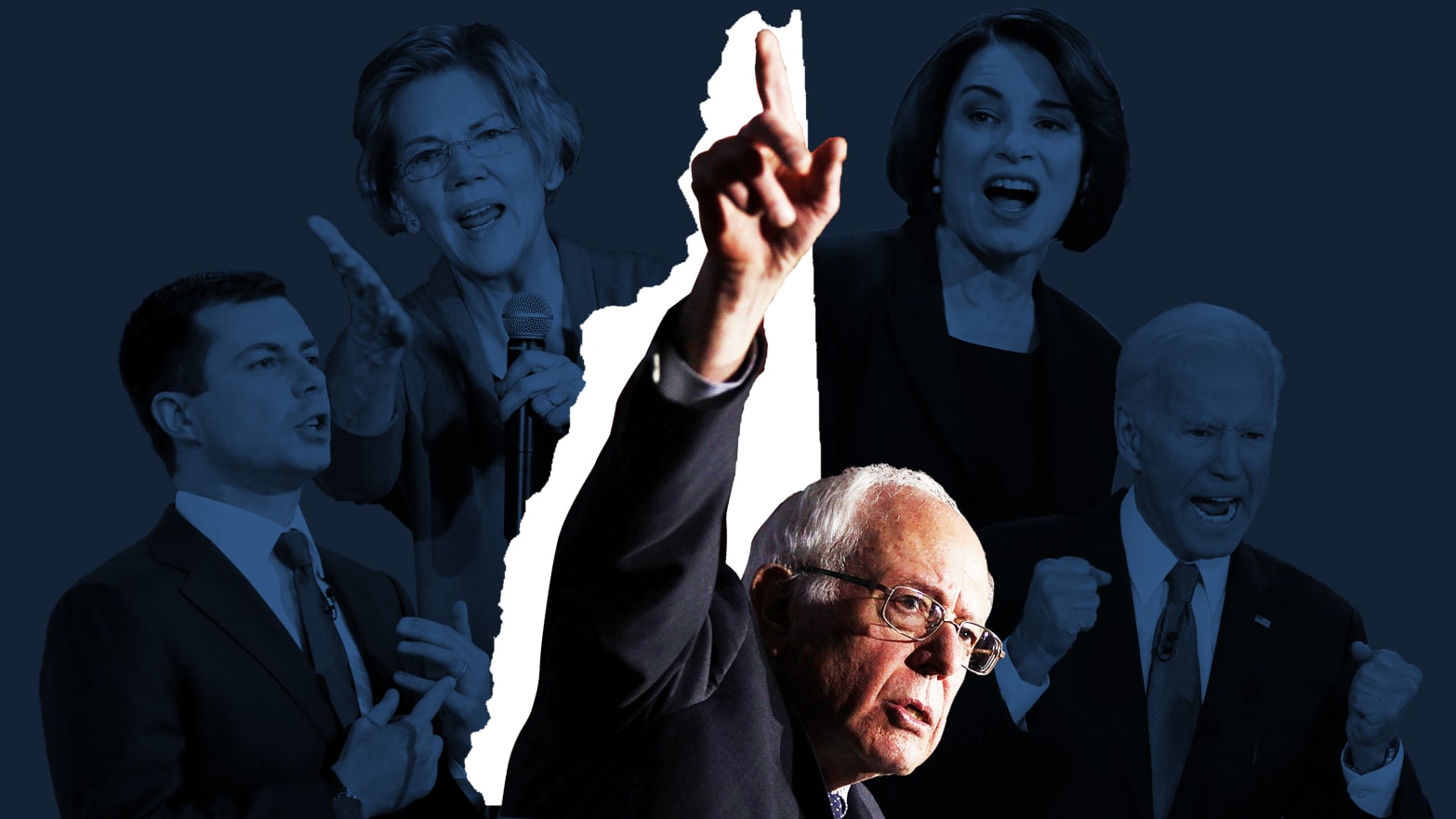Sen. Bernie Sanders (I-VT) won the New Hampshire primary on Tuesday night, scoring his second popular-vote victory in as many presidential primary contests and positioning himself as the frontrunner for the nomination of a party to which he doesn’t belong.
With 93 percent reporting it appeared Sanders was projected to win over former South Bend, Indiana, Mayor Pete Buttigieg, 26 to 24.4 percent.
The Vermont independent scored a far smaller percentage of the electorate than in 2016, when he breezed to victory in New Hampshire with 60 percent of the vote—a win that was so decisive that the race was called before many Sanders supporters could get to the celebration. But he was facing a more splintered field this go around. And in the lead-up to the vote, the prevailing theme among primary-goers was that they simply could not settle on who they wanted as their nominee.
In the end, the two closest competitors were Buttigieg and Sen. Amy Klobuchar (D-MN), who were poised to finish in second and third place, respectively.
Sanders emerged on top in large part because of the unmatched organizational apparatus that he has built. On Saturday alone, his campaign knocked on 150,000 doors. The state itself has only an estimated 640,000 household units.
“You’ve got to go 24-7, balls to the wall,” said Leo Canty, 67, of Massachusetts, who had come to New Hampshire to campaign for Sanders and planned to head down to Florida for a 10-day stretch to do the same in March. “It’s worth it.”
But even as Sanders tallied another victory, questions continue to confront the Vermont senator. He has not broken 30 percent of the vote in either Iowa or New Hampshire, and as the rest of the field could winnow further in the coming weeks, the likelihood increases that the party may consolidate around a more moderate competitor. While moderate candidates together made up more of the vote than the Sanders and Warren faction of the party, the lack of consolidation cleared the way for Sanders’ victory. But things seem likely to be thrown into even more chaos going forward as former New York City Mayor Michael Bloomberg, who has already spent hundreds of millions of dollars improving his polling position in later primary states, starts competing for votes.
Buttigieg, for his part, presented a significant challenge to Sanders in his neighboring state, carrying over from the dizzying results of the Iowa caucuses, the aftermath of which New Hampshire voters felt for days. Both candidates declared victory hundreds of miles away in the Hawkeye State—each campaigning on those victories in swings through New Hampshir. The results here are clearer, but the direction of the party is not.
Buttigieg, the 38-year-old former Midwestern mayor, possesses a decidedly different vision for the Democratic Party from Sanders. The millennial candidate who prefers incremental government change over Sanders’ calls for a total overhaul has stumped heavily on the notion that he has relevant experience outside Washington and that working with Republicans is often necessary to generate change. In addressing that, progressives often heard the word compromise and have railed against Buttigieg accordingly.
In a speech to his supporters Tuesday night, Buttigieg began, “I admired Senator Sanders when I was a high school student” and then congratulated Sanders for a “strong showing.” He stopped short of conceding and then launched into a speech full of not-so-veiled swipes at Sanders.
“[P]olitics of my way or the highway is a road to re-electing Donald Trump,” he said. “Vulnerable Americans do not have the luxury of pursuing ideological purity over an inclusive victory.”
The Sanders audience, for its part, broke into a “Wall Street Pete” chant as Buttigieg spoke, though the audio was not playing in the gymnasium where they had congregated. When the senator took the stage, the roars were deafening, and a sea of blue and white Bernie signs emerged above their heads, blocking the view of the candidate on the stage. Sanders gave them a defiant fist jab, claimed victory to more cheers, and urged unification among the Democratic field.
“I know I speak for every one of the Democratic candidates in that no matter who wins, and we certainly hope it’s going to be us, we’re going to unite together,” Sanders said to cheering supporters. “We are going to unite together and defeat the most dangerous president in the modern history of this country.”
In interviews with The Daily Beast, top operatives said that they had never witnessed a presidential primary that seemed so likely to result in a convention with no clear winner.
“If it doesn’t happen this year, with this field including Bloomberg, it’s hard to see how it will ever happen,” said Joe Trippi, a longtime party operative. “And if it does happen this year, it would be hard to have worse timing given the risk that a fractured party may not be able to unite in time to defeat Donald Trump in November.”
The uncertainty of the process has led observers to draw parallels to the 1988 Democratic primary, where a crowded field of liberals, newcomers, and moderates ended with the nomination of Massachusetts Gov. Michael Dukakis. But the man who won that contest said the analogy is flawed.
“I don’t see many similarities,” Dukakis told The Daily Beast, “if only because Trump is such a unique character in this picture, and while I think the differences among the candidates are wildly exaggerated—Bernie is no socialist and I don’t understand why he insists on calling himself one—and I wish they would stop going after each other. We had very little of that in 1988. It will take a while for this to play out even as it did in 1988. I didn’t effectively clinch the nomination until the middle of April in New York.”
Sanders, for his part, has done relatively little to expand his appeal to the more moderate wings of the party, arguing instead that his prescription of liberal policies—chief among them Medicare for All—would compel young and minority voters to participate in the electoral process in massive numbers. His victory party on Tuesday was filled with students and young adults, many of whom hailed from out of state and fanatically waved campaign signs as good electoral news appeared on the big screen in the back of the gymnasium.
The data is mixed on whether he’s achieved that so far. The senator benefited on Tuesday from the poor showing of the other self-identified liberal in the race, Sen. Elizabeth Warren (D-MA). But he also relied on a community of dedicated volunteers to help push him to victory.
Dawn Jones, 54, of Illinois, said she had spent 30 days in Iowa volunteering for Sanders without pay, driving two and a half to four hours each way to get to campaign locations before heading back home. She was on her 10th day in New Hampshire and had plans to continue volunteering beyond that.
“If you want change, you need to sacrifice,” Jones said of her efforts. “You can sit at home and play on your computer and watch your little videos. But then nothing will change for the better.”


